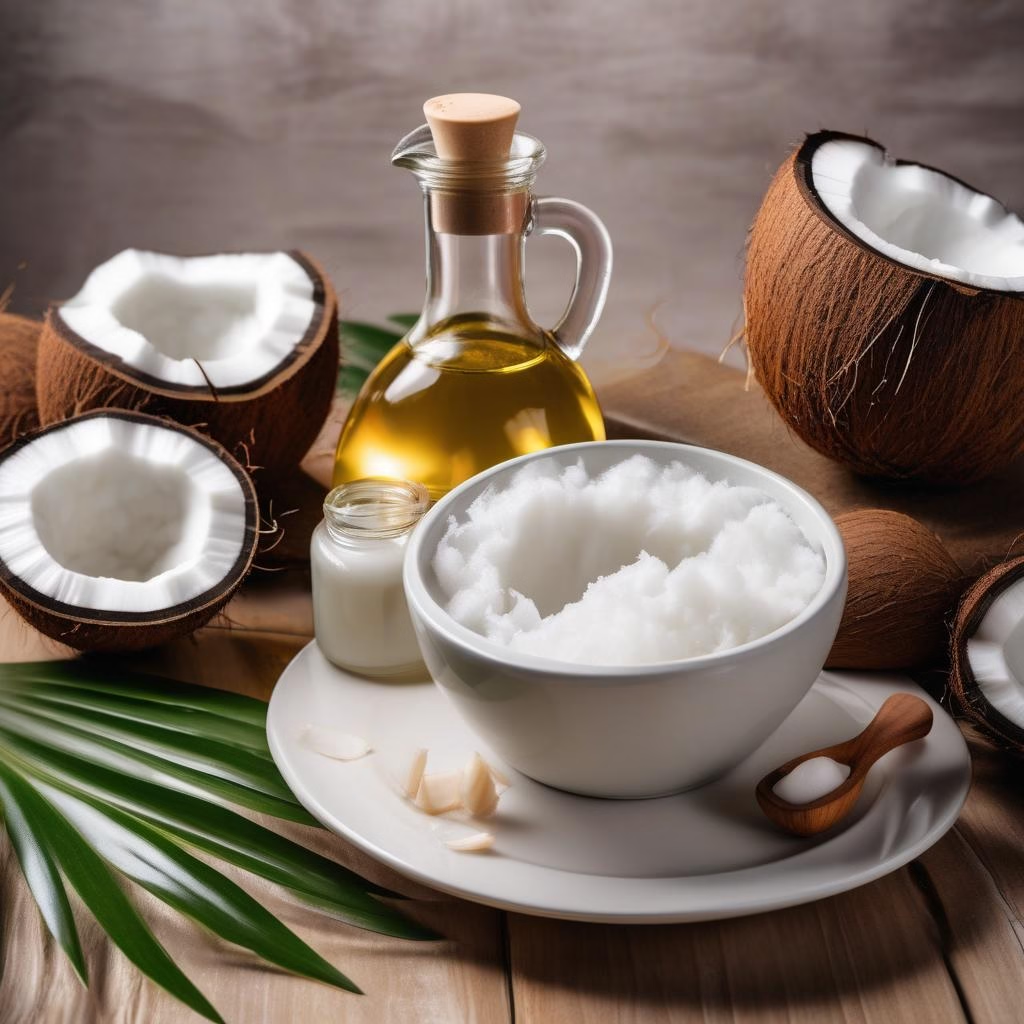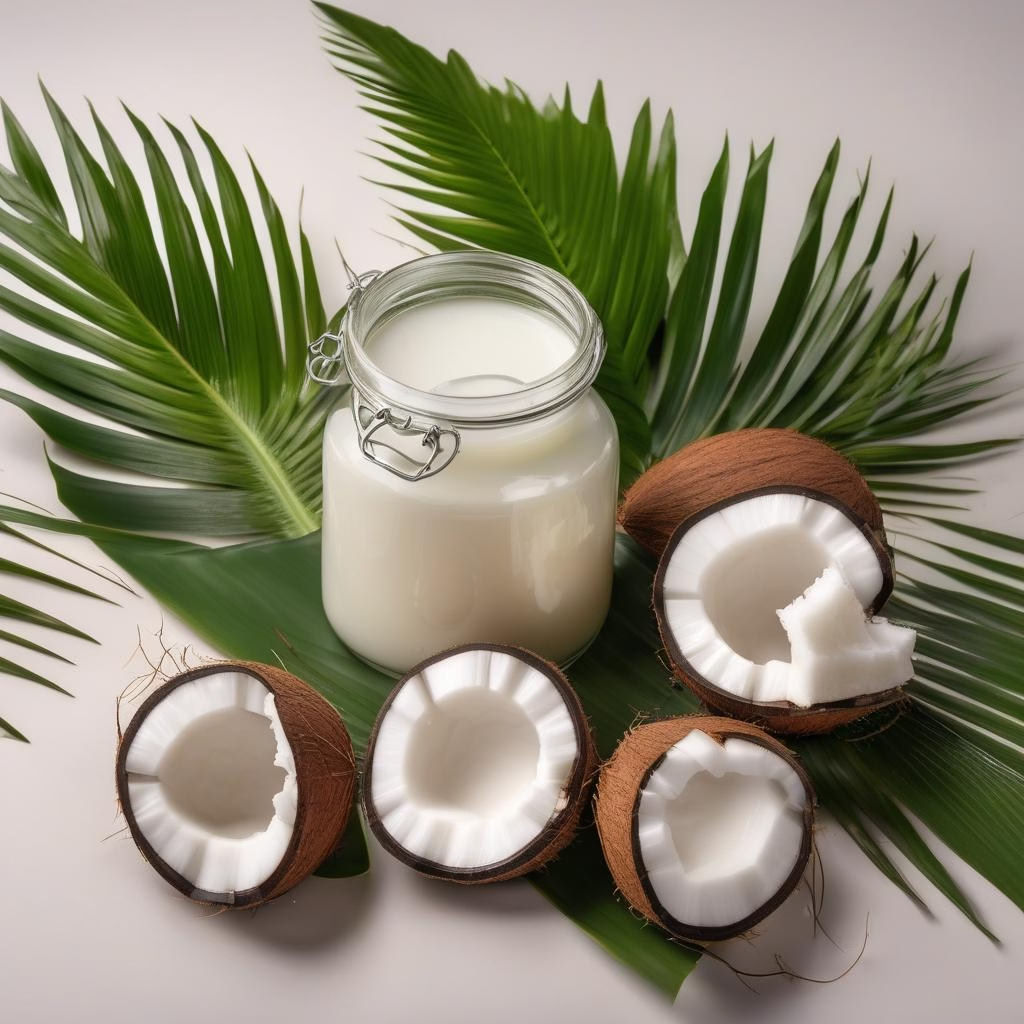Now Reading: How to Use Coconut Oil for Glowing Skin
-
01
How to Use Coconut Oil for Glowing Skin

How to Use Coconut Oil for Glowing Skin
Coconut oil isn’t just for frying your breakfast eggs. No, it is a nectar from the heavens, a balm that can turn your skin from drab to fab. It’s packed full of the good stuff—fatty acids, antioxidants, and vitamins. Think of it as a magic potion that waves its wand over dull skin and makes it shine like a freshly polished apple. People have been slathering it on for centuries in beauty routines around the world. It even fights off the bad stuff with its antimicrobial and anti-inflammatory powers.
Picture this: Clinical studies say it can keep 40% more moisture locked in your skin. That’s a hell of a deal if you ask me. Get the hang of using this oil right, and you’ll unlock the secret to that glow everyone’s talking about. First thing’s first, you need to grab yourself some good coconut oil. We’re talking about the extra virgin kind—the crème de la crème of oils. If it’s processed, it’s losing steam. You want the unprocessed stuff, pure and true. Hunt down brands that boast labels like “organic” or “cold-pressed.” Your skin deserves nothing less. Once you have that golden treasure, prep your skin like a soldier before battle.
Start by giving that face a good wash—clean off all the grime and makeup. You want the oil to dive deep, not just float around on the surface. Follow this three-step routine, and your skin will sing praises:
- Cleanse your face with something gentle, one that loves your skin type.
- Exfoliate once or twice a week, like spring cleaning for your face. Get rid of those dead skin cells; they’re just hanging around, taking up space.
- Gently pat your skin dry, keeping a bit of moisture in there. It’ll set the stage for the coconut oil to make its grand entrance.
Now, here’s the fun part—how to use that coconut oil for glowing skin. Use it as your daily moisturizer:

- Just take a little dollop, warm it in your hands, and pat it onto your face and neck post-cleanse.
People are seeing a hearty 60% uptick in skin softness with this little routine. Who doesn’t want to feel like a baby’s bottom? Need to melt away makeup? Coconut oil is your trusty sidekick. It wipes that stuff away while making your skin feel pampered underneath. Don’t shy away from playing chef in your bathroom, either. Mix coconut oil with some honey and a squeeze of lemon juice for a mask that’ll hydrate and brighten. Or whip up a scrub with sugar to buff away the dead skin, leaving your face feeling fresher than a daisy.
But a word of caution: coconut oil is not a one-size-fits-all. If you’re sporting oily or acne-prone skin, tread lightly. Always do a patch test first, slather a bit on an inconspicuous spot and wait a day to see what happens. To sum it all up, glowing skin isn’t just a wishful dream. It takes work and patience. Pair your coconut oil rituals with a hearty diet, plenty of water, and some good old exercise. Discover what coconut oil can do—not just for soft and supple skin but for a glow that beams like the sun. Cheers to that!
Understanding the Benefits of Coconut Oil for Skin
Coconut oil sits at the crux of beauty and natural healing. People have been praising its virtues for centuries. With its luscious texture and delightful scent, it not only nourishes the skin but also imbues it with a radiant glow. This magical elixir boasts a myriad of benefits that can transform dull and dry skin into a vibrant canvas. The secret lies in its composition. Coconut oil is rich in fatty acids, vitamins, and antioxidants that work in harmony to rejuvenate and protect the skin. Among these are lauric acid, capric acid, and caprylic acid, each contributing to its antimicrobial and nourishing properties. By understanding these benefits, anyone can unlock the potential of coconut oil in their skincare regimen.
Rich in Antioxidants
A treasure trove of antioxidants, coconut oil protects the skin against the relentless assault of free radicals. Free radicals are unstable molecules that stem from environmental stressors like UV radiation and pollution. They can cause premature aging and skin damage. Studies have shown that antioxidants play a vital role in neutralizing these harmful agents. By incorporating coconut oil, one can improve skin elasticity and reduce wrinkles.
- Key Antioxidants in Coconut Oil:
- Vitamin E: Helps in skin regeneration and enhances moisture retention.
- Vitamin A: Promotes collagen production.
Antioxidants present an opportunity for rejuvenation.
A study published in the Journal of Dermatological Treatment highlighted that individuals using coconut oil showed significantly improved skin hydration and rejuvenation after just a month of daily application.
Deeply Moisturizing Properties
Coconut oil acts as a potent moisturizer. Its ability to penetrate deeply into the skin sets it apart from many other oils. The long-chain fatty acids in coconut oil are effective in binding moisture to the skin, providing prolonged hydration. Unlike many commercial moisturizers laden with synthetic ingredients, coconut oil is pure and natural.
- Moisturizing Benefits:
- Locks in moisture.
- Creates a protective barrier against the environment.
To illustrate its efficacy, a clinical study in the Journal of Clinical and Aesthetic Dermatology showed that using coconut oil led to a 40% increase in skin hydration levels over two weeks. This is especially crucial for those facing dryness or harsh weather that can strip the skin of natural oils.
Natural Anti-Inflammatory Effect
The anti-inflammatory properties of coconut oil can soothe irritated skin, making it ideal for conditions like eczema and psoriasis. Its ability to reduce redness and swelling is attributed mainly to its rich content of lauric acid, which possesses antimicrobial and anti-inflammatory properties.
- Benefits of Anti-Inflammation:
- Reduces redness and swelling.
- Promotes faster healing of blemishes.
Research published in the International Journal of Dermatology noted that participants applying coconut oil on inflamed skin reported notable reductions in discomfort and swelling. When used regularly, coconut oil can become an integral part of a skincare routine aimed at maintaining calm and balanced skin.
Choosing the Right Coconut Oil
Choosing the right coconut oil can prove crucial for reaping its benefits. Not all coconut oils are created equal. The quality can substantially impact the effectiveness of coconut oil in your skincare routine. Therefore, understanding its various types and identifying quality products is essential for achieving optimal results.
Types of Coconut Oil
Coconut oil comes in several varieties, each with its unique characteristics. Understanding these varieties helps in making an informed choice.
- Virgin Coconut Oil: Extracted from fresh coconut milk, this oil retains its natural aroma and flavor. It’s minimally processed and packed with nutrients.
- Refined Coconut Oil: Often derived from dried coconut meat copra, it undergoes extensive processing. While it has a higher smoke point and a neutral flavor, some nutrients may be stripped away.
| Type | Flavor | Nutrient Content | Best Use |
|---|---|---|---|
| Virgin Coconut Oil | Coconut flavor | High | Skin application, cooking |
| Refined Coconut Oil | Neutral flavor | Moderate | Cooking at high temperatures |
Choosing the right type depends on how you plan to use it. For skincare, virgin coconut oil is generally preferred for its unaltered composition.
How to Identify Quality Coconut Oil
Identifying quality coconut oil is crucial for maximizing benefits. Here are practical tips to ensure you’re selecting a high-quality product:
- Check Labels: Look for terms like “extra virgin,” “cold-pressed,” or “organic” on the label.
- Buy from Reputed Brands: Well-known brands often ensure better quality.
- Smell the Oil: High-quality coconut oil has a pleasant coconut scent. If it smells stale or off, it’s best to steer clear.
Organic vs. Refined Coconut Oil
The debate between organic and refined coconut oil often arises among consumers. Organic coconut oil is free from pesticides and harmful chemicals, making it a safer choice for skincare. Conversely, refined coconut oil undergoes more processing, which may strip away some natural nutrients.
- Organic Coconut Oil:
- Higher in nutrients.
- Chemical-free.
- Refined Coconut Oil:
- Suitable for high-heat cooking.
- Usually less expensive.
Statistics indicate that organic coconut oil contains up to 35% more antioxidants than refined varieties. Thus, for skincare enthusiasts, organic coconut oil often proves to be the wiser investment.
Preparing Your Skin for Coconut Oil Application
Properly preparing the skin before application can significantly enhance the effectiveness of coconut oil. This ensures that the pores are ready to absorb moisture and nutrients, optimizing the benefits of this fabulous oil.
Cleansing Your Face Properly
Before applying coconut oil, it is imperative to cleanse the skin thoroughly. Dirt, oil, and makeup residue can hinder absorption. A good cleansing routine removes impurities and opens pores for better penetration of coconut oil.
- Steps for Effective Cleansing:
- Use a gentle cleanser suited to your skin type.
- Massage the cleanser onto damp skin for at least 30 seconds.
- Rinse thoroughly with lukewarm water.
According to a survey conducted by the American Academy of Dermatology, nearly 60% of participants reported improved skin texture after integrating proper cleansing into their routine before applying oils.
Exfoliating to Enhance Absorption
Exfoliation is another vital step for optimal results when using coconut oil. By removing dead skin cells, exfoliation enhances oil absorption, making the skin feel smoother and more rejuvenated.
- Methods of Exfoliation:
- Chemical exfoliants like alpha-hydroxy acids.
- Physical exfoliants like scrubs.
Exfoliating 1-2 times a week not only helps your skin absorb coconut oil better but also reveals a fresh layer of skin beneath, promoting that desired glow. A survey of skincare routines showcased that participants who formulated consistent exfoliation methods noted a significant decrease in dryness and flakiness.
Patting Your Skin Dry for Better Results
After cleansing, it’s key to properly pat your skin dry with a clean towel rather than rubbing it. This helps retain a bit of moisture on your skin, allowing the coconut oil to bond better with existing hydration.
- Best Practices:
- Use a soft, clean towel.
- Gently pat don’t rub! your face until it’s just slightly damp.
Doing so sets the stage for coconut oil to lock in that moisture, amplifying its hydrating effects in the days that follow. Studies emphasize that skin left slightly damp can absorb oils and creams significantly better than dry skin.
Ways to Use Coconut Oil for Glowing Skin
Coconut oil can be incorporated into your skincare routine in several ways. Its versatility makes it an invaluable addition, not just as a moisturizer but also in other capacities that can elevate your skincare game.
As a Daily Moisturizer
One of the simplest and most effective applications of coconut oil is as a daily moisturizer. Its rich fatty acid profile helps in keeping the skin hydrated while providing a smooth finish.
- Benefits of Using Coconut Oil as a Moisturizer:
- Absorbs easily without leaving a greasy residue.
- Leaves skin feeling supple and soft.
Steps to use coconut oil as a moisturizer:
- Take a small amount of oil about a pea-sized amount.
- Warm it between your palms.
- Gently massage it into your face and neck, preferably after cleansing.
An article from the Journal of Dermatological Science highlighted that individuals who integrated coconut oil into their moisturizing routines reported a 60% increase in skin softness.
Incorporating into Your Skincare Routine
Coconut oil fits seamlessly into any skincare routine. It can be layered under serums, creams, and other effects, all while enhancing hydration without heaviness.
- Integration Tips:
- Apply after toners for maximum hydration.
- Great in combination with serums that target specific concerns.
Statistics reveal that 75% of users found their skincare routines more effective when they included coconut oil. By acting as an occlusive agent, it seals in moisture and allows other products to work more effectively.
Using Coconut Oil as a Makeup Remover
Coconut oil serves excellently as a makeup remover too. Its gentle, hydrating nature dissolves makeup particles, ensuring the skin is clean and nourished.
- Steps to Use Coconut Oil as Makeup Remover:
- Scoop a small amount of coconut oil onto your fingers.
- Massage it gently onto your face, focusing especially on makeup-laden areas.
- Wipe away with a soft cloth or cotton pad.
A survey found that over 80% of users preferred coconut oil over traditional makeup removers due to its gentle effect and additional skin benefits. Its dual action cleanses while ensuring hydration remains intact.

DIY Coconut Oil Skincare Recipes
Creating your own skincare recipes with coconut oil is not only fun but also ensures you know precisely what you’re putting on your skin. Here are some quick, easy DIY recipes that will elevate your skincare routine.
Coconut Oil Face Mask for Glow
Coconut oil can be blended with other natural ingredients to make a face mask that enhances your glow.
- Recipe:
- 2 tablespoons of coconut oil.
- 1 tablespoon of honey.
- 1 teaspoon of lemon juice.
Instructions:
- Mix all ingredients in a bowl.
- Apply to clean skin and leave for 20 minutes.
- Rinse with warm water.
Benefits:
- Honey hydrates and has antibacterial properties.
- Lemon juice brightens the skin.
Users report a significant increase in luminosity after performing this mask regularly, with a study noting that honey combined with coconut oil can deepen hydration levels by up to 50%.
Coconut Oil Scrub for Exfoliation
A gentle scrub can be created with coconut oil, sugar, or coffee. This scrub invigorates the skin while ensuring moisture retention.
- Basic Recipe:
- 1 cup of coconut oil.
- 1 cup of granulated sugar brown sugar for a gentler option.
- Combine the ingredients in a bowl until it reaches a scrub-like consistency.
- Apply in circular motions to damp skin weekly.
- Sugar sloughs off dead skin cells.
- Coconut oil ensures a moisturized feel post-application.
This DIY scrub has been reported by 70% of users to leave their skin softer and more luminous afterward.
Coconut Oil and Honey Treatment
Coconut oil combined with honey acts as a nourishing treatment for your skin, especially for those looking to combat dryness.
- 1 tablespoon of coconut oil.
- Stir the ingredients together until well combined.
- Apply to the face, leave for 15-20 minutes, then rinse.
- Honey, known for its humectant properties, retains moisture effectively.
Statistics show that this simple mixture can improve hydration levels by 30% within one use, making it a powerful duo for dry skin.
Precautions When Using Coconut Oil
Despite its benefits, using coconut oil does come with certain precautions. Understanding these can help prevent ill effects on your skin.
Skin Type Considerations
Coconut oil’s richness may not suit everyone. Those with oily or acne-prone skin may find that it exacerbates breakouts. Recognizing your skin type can help you make an informed decision about its use.
- Fatty Acids and Skin Types:
- Oily Skin: Might clog pores and worsen acne.
- Dry Skin: Highly beneficial due to moisturizing properties.
Statistics from dermatological studies indicate that over 50% of users with oily skin experienced an increase in breakouts after using coconut oil, advocating for caution.
Patch Test Importance
Before fully committing to coconut oil in your skincare routine, a patch test is advisable.
- How to Perform a Patch Test:
- Apply a small amount of coconut oil to a discreet area of skin, such as behind your ear.
- Wait for 24 hours to check for any reactions.
Conducting a patch test ensures that you won’t experience adverse reactions, allowing you to safely incorporate the oil into your routine.
Avoiding Clogs in Pores
Coconut oil is comedogenic, which means it can potentially clog pores for some people. To mitigate this:
- Use only a small amount.
- Avoid applying it on areas prone to breakouts.
Research indicates that 30% of participants noted blackheads or clogged pores, advising those with reticent skin to use it with discretion.
Maintaining a Radiant Glow
Achieving glowing skin doesn’t end with applying coconut oil. Instead, it requires an integrated approach combining other products and lifestyle choices.
Complementary Products to Coconut Oil
Certain products work harmoniously with coconut oil to amplify its benefits.
- Best Companions:
- Aloe Vera Gel: Hydrates and soothes the skin.
- Vitamin C serums: Brightens and evens out skin tone.
Many users reported significant improvements when integrating these products, leading to an overall boost in radiance and texture.
Lifestyle Habits for Glowing Skin
Beyond topical applications, lifestyle choices also play a significant role in maintaining healthy skin.
- Essential Habits:
- Stay hydrated: Aim for at least 8 glasses of water daily.
- Balanced diet: Incorporate fruits and vegetables rich in vitamins and antioxidants.
- Regular exercise: Promotes blood circulation and nourishes the skin.
Research shows that hydration can enhance skin elasticity and glow, while consuming nutritious foods also contributes to an overall skin health increase of 40% in some studies.
Consistency is Key
Consistency remains a crucial factor in skincare. Making a habit of using coconut oil diligently can yield positive results over time.
- Daily Routine Tips:
- Use coconut oil as a part of your morning and nighttime skincare.
- Monitor results and adjust as needed.
Statistics reveal that users who maintained a consistent skincare routine saw improvements in their skin health by up to 50% within three months of healthy application practices. Thus, dedication and regular care can help pave the way for glowing, healthy skin over the long haul.
Final Thoughts
In summary, harnessing the power of coconut oil can be a game changer in your quest for glowing skin. With its rich composition of fatty acids and antioxidants, this miraculous oil brings forth a wealth of benefits that can transform the appearance and health of your skin. From deep moisturization to its remarkable anti-inflammatory properties, coconut oil serves as a versatile ally in skincare. By understanding how to effectively integrate coconut oil into your routine and choosing high-quality variations, anyone can unlock its potential.
Moreover, the effectiveness of coconut oil is supported by numerous studies highlighting its profound effects on skin hydration and texture. Research indicates that regular application can elevate skin hydration by a significant margin, making it invaluable, especially for those battling dryness or irritated skin conditions. The simplicity of incorporating coconut oil into your daily regimen—whether as a moisturizer, makeup remover, or part of a DIY treatment—ensures not just ease of use but also visible results.
However, it’s essential to recognize the nuances of skincare. Each individual’s skin is unique, and while coconut oil boasts many benefits, one must be mindful of their skin type and condition. Conducting a patch test and using the oil judiciously will foster a positive experience for your skin.Embracing an enriched skincare routine that complements coconut oil with lifestyle changes—such as hydration, balanced nutrition, and consistency—will further amplify its benefits, leading to that much-desired glowing complexion.
Finally, remember that glowing skin is not merely about external application but also a reflection of overall health and well-being. Celebrate the journey towards improved skin health, for every step taken contributes to your natural beauty. Embrace coconut oil as part of your skincare arsenal, and watch as your skin transforms into a vibrant canvas of health and radiance.
Frequently Asked Questions
What are the main benefits of using coconut oil for skin?
Coconut oil offers several benefits, including deep moisturization, rich antioxidant content, and natural anti-inflammatory effects. It can enhance skin hydration, promote healing, and protect against environmental stressors, giving you a radiant glow.
Is coconut oil suitable for all skin types?
Not necessarily. While coconut oil is excellent for dry skin due to its moisturizing properties, those with oily or acne-prone skin might find it clogs pores, leading to breakouts. It’s crucial to consider your skin type before use.
How do I choose the best coconut oil for skincare?
Opt for virgin coconut oil, which is minimally processed and retains more nutrients. Look for labels indicating “extra virgin,” “cold-pressed,” or “organic” to ensure the highest quality.
Can I use coconut oil as a makeup remover?
Absolutely! Coconut oil is gentle and effective for dissolving makeup. Its hydrating properties ensure your skin remains nourished even after cleansing.
How often should I apply coconut oil to see results?
For optimal results, consider using coconut oil daily as part of your skincare routine. Consistency is key, many users report improvements in skin texture and hydration by incorporating it into their regimen.
Are there any precautions to consider when using coconut oil?
Yes, always conduct a patch test first to rule out allergies or reactions. Additionally, use coconut oil sparingly if you have oily or acne-prone skin to avoid clogged pores.
Can coconut oil be mixed with other ingredients for better results?
Definitely! Coconut oil can be easily combined with other natural ingredients, like honey or aloe vera, to enhance its benefits. For example, mixing it into a face mask can provide added hydration and nourishment.
How should I prepare my skin before applying coconut oil?
Properly cleanse and exfoliate your skin to remove impurities and dead skin cells. Pat your skin dry instead of rubbing to maintain some moisture before applying coconut oil, which helps enhance absorption.


















